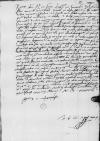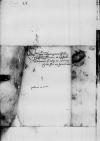List #1842
Ioannes DANTISCUS do Tiedemann GIESEHeilsberg (Lidzbark), 1538-03-24
Regest polski:
Dantyszek opisuje Giesemu swój ból po śmierci biskupa krakowskiego [Jana Chojeńskiego], uważa tę śmierć za wielką stratę dla Kościoła i państwa; snuje refleksje o tym, że odchodzą najlepsi, a zostają tylko nieużyteczni, krytykuje dostojników kościelnych w Rzymie – o ich zepsuciu świadczy między innymi zwłoka przy załatwieniu formalności związanych z konfirmacjami jego i Giesego.
Dantyszek deklaruje, że pójdzie za radą Giesego i dokona w terminie konsekracji Krzyżma, choć nie otrzymał jeszcze dokumentów; napisze obszerniej, kiedy opanuje wstrząsające nim uczucia; będzie się modlił za świętą w jego opinii duszę zmarłego.
Rękopiśmienne podstawy źródłowe:
Publikacje:
| ||||||
Tekst + aparat krytyczny + komentarz Zwykły tekst Tekst + komentarz Tekst + aparat krytyczny
Reverendissimo Domino
Reverendissime Domine, frater et amice carissime ac honoran(de) or honoran(dissime)⌈honoran(de)honoran(de) or honoran(dissime)⌉.
Salutem et fraterni amoris commendationem.
Quid de obitu reverendissimi domini
Ceterum, cum iam de nostris confirmationibus simus securi, licet diplomata non adsint, in<n>itar Dominationis Vestrae Reverendissimae consilio acturus statuto tempore apud ecclesiam[2] chrismatis consec written over t⌈tcc written over t⌉rationem.
Pauloque post de omnibus latius – plura scribere rorantes oculi, nedum dolor et gemitus, vetant. Deus Omnipotens animae illi, meo sane iudicio sanctae, cf. Vulg. Io 14.23 Si quis diligit me, sermonem meum servabit, et Pater meus diliget eum, et ad eum veniemus, et mansionem apud eum faciemus ⌊aeternam apud se det mansionemcf. Vulg. Io 14.23 Si quis diligit me, sermonem meum servabit, et Pater meus diliget eum, et ad eum veniemus, et mansionem apud eum faciemus ⌋, am(en), et Dominationi Vestrae Reverendissimae, quae multam mihi precatur felicitatem, parem et auctiorem, aetatemque diutissime incolumem.
Ex
Reverendissimae Dominationis Vestrae integerrimus frater


 BCz, 245, p. 24
BCz, 245, p. 24